People who were more intensely exposed to coronavirus became more anti-social than those with lower exposure, finds a new study co-authored at the University of Cambridge based on the pandemic outbreak in China.
This anti-social response was particularly pronounced for individuals who experienced an increase in depression or in their negative mood, says the study in the February 2023 edition of the Journal of Economic Behavior and Organization. These changes in anti-social behaviour were likely driven by a deterioration in mental health, as there was no link between virus exposure and physiological well-being.
Public policy should be changed to focus on mental health

“The findings underline the importance of paying increased attention to mental health issues at the initial stage of a public health emergency,” says study co-author Paul Lohmann, Research Associate at the El-Erian Institute of Behavioural Economics and Policy at Cambridge Judge Business School.
“Governments understandably devote resources to mitigating a virus outbreak such as ramping up medical treatment, but the study suggests that intervention in the form of psychological support is also a critical element in responding to health emergencies.”
The study is based on experiments conducted on university students in Beijing (mostly from Renmin University) in late 2019, just before the coronavirus outbreak, and then again shortly after the first pandemic wave in March 2020.
How the infection rate correlated to social media sentiment
To measure exposure to COVID-19, the study looks at epidemiological measures of virus prevalence as well as Big Data extracted from Chinese social media – city-level public concern and anxiety based on search volume from China’s largest search engine Baidu, and negative sentiment as expressed in 523,222 microblog posts from Sina Weibo (the Chinese equivalent of Twitter).
Both the Baidu search index and the negative sentiment index correlated positively to the infection rate, so the researchers believe that the 2 indices “provide valid measures of social sentiment, reflecting the intensity of exposure to the virus”.
Joy of Destruction: a game that measures anti-social behaviour
The study then examines anti-social behaviour through participant decisions in several games, including the Joy of Destruction Game and the Take Game. In the Joy of Destruction (JOD) game, participants face the decision whether to destroy their playing partner’s initial endowment of 20 Yuan at a cost of 2 Yuan, or maintain the status quo – with the understanding that there is a one-third possibility that the other player’s endowment will be halved to 10 Yuan regardless of their choice.
“The design of JOD game removes all conventional motivations for anti-social behaviour and further allows destructive behaviour to be partially hidden behind a component of random destruction,” the study says, while the Take Game introduces an element of covert anti-social behaviour in the form of theft.
The researchers found that individuals more exposed to the virus took a “statistically significant” amount more of their paired player’s endowment in both games.
Investing in online and smartphone psychological help
The study outlines in depth the practical public policy implications for tackling major health crises in the future. “The indication that mental well-being is likely responsible for the increase in anti-social behaviour can inform better targeted policies and relief programmes,” the study says. “In the context of COVID-19 or similar events, investments should therefore also focus on expanding the supply of consultation with mental health professionals in the form of online and smartphone-based psychological support avenues that can reach a wider audience of potentially affected people.”
Featured academic
Paul Lohmann
Research Associate, El-Erian Institute of Behavioural Economics and Policy
Featured research
Lohmann, P.M., Gsottbauer, E., You, J. and Kontoleon, A. (2023) “Anti-social behaviour and economic decision-making: panel experimental evidence in the wake of COVID-19.” Journal of Economic Behavior and Organization


